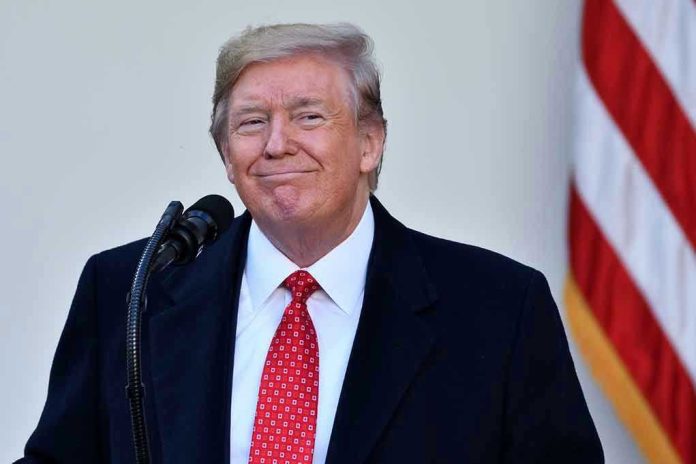
One European leader says her country’s children now sleep without fear of war—because of a foreign president’s hardline “peace through strength” mantra.
Story Snapshot
- Kosovo President Vjosa Osmani credits Donald Trump’s deterrence and diplomacy for keeping her nation safe from conflict.
- Trump’s “peace through strength” is publicly praised by European heads of state as a bulwark against regional aggression.
- Recent European summits spotlight Trump’s influence on Ukraine peace talks and continental stability.
- Direct testimonials and bipartisan recognition position Trump’s approach in stark contrast to prior U.S. policy.
Trump’s Foreign Policy Brings Unlikely Praise from Kosovo
Kosovo, a nation once synonymous with Balkan violence, now finds its president extolling the virtues of Donald Trump’s foreign policy. Vjosa Osmani has gone on record crediting Trump’s “peace through strength” doctrine for protecting Kosovo from renewed conflict with Serbia. In a region where memories of war are still fresh, Osmani’s public statements represent not just diplomatic gratitude, but a rare endorsement from a sitting European leader for an American president’s deterrence-first strategy. She describes a reality where Kosovo’s children, unlike those of prior generations, are growing up without the shadow of war—a result, she says, of Trump’s commitment to deterrence and unambiguous messaging to potential aggressors.
Her comments have not gone unnoticed in European capitals, where officials debate the efficacy of U.S. leadership in a continent once again rattled by war in Ukraine. Osmani’s perspective is echoed by other leaders who attended a recent White House summit, crediting Trump’s assertive diplomacy with keeping the powder keg of the Balkans from reigniting. Her remarks draw a clear line between the peace her country enjoys today and the direct intervention of a U.S. president who, in her words, “sent a message autocrats understand.”
Peace Through Strength: Doctrine and Outcomes
Trump’s “peace through strength” approach—sometimes derided as simplistic—has produced results in Kosovo that are difficult to ignore. The 2020 economic normalization agreement, brokered by his administration, marked a turning point in relations between Kosovo and Serbia. Unlike previous U.S. diplomatic efforts, which often vacillated between engagement and withdrawal, Trump’s policy was defined by clarity and a willingness to project power without necessarily deploying it. Osmani’s endorsement is rooted in real-world outcomes: tangible safety for her people, and the normalization of day-to-day life in a region once gripped by ethnic conflict and uncertainty.
On behalf of the people of Kosovo, thank you President @realDonaldTrump for your outstanding contribution to peace in our region. @HouseForeignGOP #PeaceThroughStrength https://t.co/XHwNrFQ9SF
— Vjosa Osmani (@VjosaOsmaniPRKS) September 23, 2025
European leaders now cite these outcomes as evidence that Trump’s methods—controversial though they may be—have delivered peace dividends. In the face of Russian aggression in Eastern Europe, the same approach has been invoked as a model for deterring further escalation. At a high-profile White House summit in August 2025, European officials openly credited Trump’s stance with changing the strategic calculus in the region, encouraging Ukraine peace talks, and reassuring NATO’s eastern flank.
Kosovo’s Safety, Europe’s Security: Expanding the Doctrine
The implications of Osmani’s praise extend far beyond the Balkans. Her endorsement is part of a chorus of European voices urging continued American engagement—and, crucially, the kind of visible deterrence that characterized Trump’s tenure. Congressional leaders in Washington have seized on these public testimonials, nominating Trump for a Nobel Peace Prize and calling his diplomacy a “masterclass.” They cite the reduction in violence between Kosovo and Serbia, the stability gained in the region, and the momentum in peace talks with Ukraine as proof that a strong, clear U.S. stance can alter the trajectory of European security.
The contrast with previous U.S. administrations is stark. Where earlier efforts often faltered in the face of shifting alliances and ambiguous commitments, the current European endorsements suggest that resolve and consistency are what deter aggression. Osmani, along with other European heads of state, frames “peace through strength” not as saber-rattling but as the only language certain adversaries respect—a perspective that resonates in capitals from Pristina to Kyiv.
Leadership, Endorsements, and the Path Ahead
Kosovo’s president continues to make her case in public forums, insisting that Trump’s leadership enabled her country to move from survival to stability. She points to the economic and social dividends of peace—a generation unscarred by war, commerce revived, and trauma receding. Her message has found receptive audiences in Ukraine’s leadership and among European officials wary of Russian ambitions. Trump’s role as a facilitator in ongoing peace talks cements his image as both peacemaker and guarantor—an image his supporters are eager to amplify as Europe faces its gravest security crisis in decades.
The long-term consequences of this doctrine remain the subject of debate. Supporters highlight the tangible results: normalized relations, reduced violence, and greater stability. Skeptics question whether such an approach is sustainable in a multipolar world. What is clear is that, for the moment, Kosovo’s experience is shaping the conversation about American leadership—one where deterrence, clarity, and the willingness to act are once again at the center of Europe’s security architecture.







